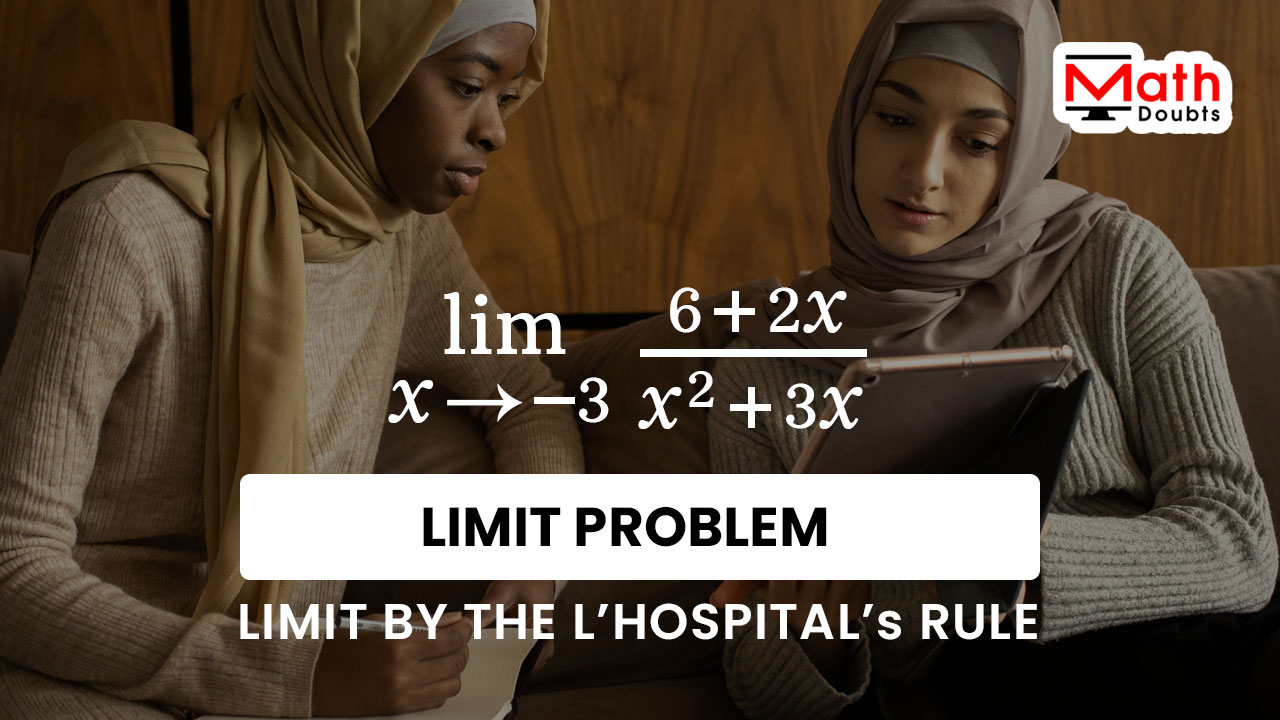The limit of six plus two times $x$ divided by square of $x$ plus three times $x$ should be evaluated by the L’Hôpital’s rule as the value of $x$ approaches negative three in this limit problem.
Firstly, let us try to find the limit of $6$ plus two times $x$ divided by $x$ square plus three times $x$ by the direct substitution method as the value of $x$ tends to $-3$.
$\implies$ $\displaystyle \large \lim_{x\,\to\,-3}{\normalsize \dfrac{6+2x}{x^2+3x}}$ $\,=\,$ $\dfrac{0}{0}$

According to the direct substitution, it is evaluated that the limit of $6$ plus $2$ times $x$ divided by square of $x$ plus $3$ times $x$ is indeterminate as the value of $x$ approaches negative $3$, and the indeterminate form expresses that the limit of $6$ plus $2x$ divided by $x^2$ plus $3x$ must be evaluated by the L’Hospital’s rule, as the value of $x$ tends to negative $3$.
The $6+2x$ is an expression in the numerator and $x^2+3x$ is an expression in the denominator, and they both are defined in terms of a variable $x$. So, differentiate the both expressions $6+2x$ and $x^2+3x$ with respect to $x$, for applying the L’Hospital’s rule to the rational function.
$=\,\,$ $\displaystyle \large \lim_{x\,\to\,-3}{\normalsize \dfrac{\dfrac{d}{dx}(6+2x)}{\dfrac{d}{dx}(x^2+3x)}}$
The derivative belongs to both terms $6$ and $2x$ in the numerator. Similarly, the derivative belongs to the terms $x^2$ and $3x$ in the denominator. The derivative of sum of the terms can be calculated by the addition rule of the differentiation.
$=\,\,$ $\displaystyle \large \lim_{x\,\to\,-3}{\normalsize \dfrac{\dfrac{d}{dx}\,6+\dfrac{d}{dx}\,2x}{\dfrac{d}{dx}\,x^2+\dfrac{d}{dx}\,3x}}$
Look at the numerator of the rational expression. The derivative of $6$ with respect to $x$ is a first term and its derivative is zero as per the derivative rule of a constant. The derivative of $2x$ with respect to $x$ can be evaluated by the constant multiple rule of the differentiation.
Now, look at the denominator of the rational expression. The differentiation of $x$ square with respect to $x$ can be evaluated by the power rule of the derivatives. The derivative of $3x$ with respect to $x$ can also be calculated by the constant multiple rule of the derivatives.
$=\,\,$ $\displaystyle \large \lim_{x\,\to\,-3}{\normalsize \dfrac{0+2 \times \dfrac{d}{dx}\,x}{2x+3 \times \dfrac{d}{dx}\,x}}$
$=\,\,$ $\displaystyle \large \lim_{x\,\to\,-3}{\normalsize \dfrac{2 \times \dfrac{d}{dx}\,x}{2x+3 \times \dfrac{d}{dx}\,x}}$
The derivative of $x$ with respect to $x$ is there as a second term in both numerator and denominator of the rational function. As per the derivative rule of a variable, the derivative of $x$ with respect to $x$ is equal to $1$.
$=\,\,$ $\displaystyle \large \lim_{x\,\to\,-3}{\normalsize \dfrac{2 \times 1}{2x+3 \times 1}}$
$=\,\,$ $\displaystyle \large \lim_{x\,\to\,-3}{\normalsize \dfrac{2}{2x+3}}$
The limit of $2$ divided by $2$ times $x$ plus $3$ as the value $x$ tends to $-3$ can be now evaluated by the direct substitution method.
$=\,\,$ $\dfrac{2}{2(-3)+3}$
$=\,\,$ $\dfrac{2}{2 \times (-3)+3}$
$=\,\,$ $\dfrac{2}{-6+3}$
$=\,\,$ $\dfrac{2}{-3}$
$=\,\,$ $-\dfrac{2}{3}$
A free math education service for students to learn every math concept easily, for teachers to teach mathematics understandably and for mathematicians to share their maths researching projects.
Copyright © 2012 - 2023 Math Doubts, All Rights Reserved